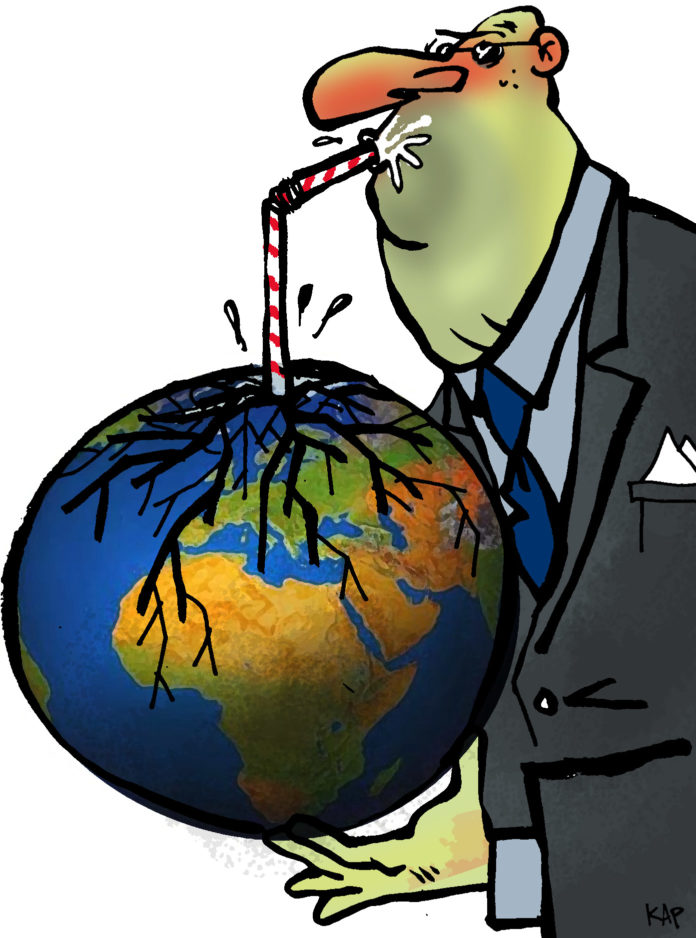BY VERN TURNER
 There are many gloom and doom artists out there writing about the demise of our world conflicts in economics and social behaviors. I have quoted several books, articles and authors in past columns who either offer a solution or redefine the problem.
There are many gloom and doom artists out there writing about the demise of our world conflicts in economics and social behaviors. I have quoted several books, articles and authors in past columns who either offer a solution or redefine the problem.
Some even go so far as to define the cause of our dilemma centered on the unequal distribution of goods, services, food, water and freedom from disease as a disconnect between rates of biological and sociological evolution [The Watchman’s Rattle – Rebecca Costa]. Others derive today’s Western version of capitalism from the 16th-19th Century loot-and-plunder tactics of Europeans against indigenous populations [What is America?: A Short History of the New World Order].
The following three quotes define, I think, why economic systems associated with capitalism are so easily perverted from its original intent.
Economic theory either resists or ignores the natural intention of humans to fend for themselves first, fend for the tribe next and to acquire, by whatever means possible, those resources that will ensure the survival of the tribe and the individual. A truly socialistic society, therefore, theoretically cannot exist.
“The problem of social organization is how to set up an arrangement under which greed will do the least harm; capitalism is that kind of system.” – Milton Friedman
“Capitalism is the astounding belief that the most wickedest of men will do the most wickedest of things for the greatest good of everyone.” – John Maynard Keynes.
“Unregulated capitalism will destroy itself from within.” – paraphrased from Karl Marx.
Obviously, history has shown that these three statements have been, to varying degrees, accurate. It is how they are balanced during any given period that determines how well or how poorly the society does while operating under capitalism.
When there is sufficient money circulating, more people do well. When the money is being hoarded or moved to offshore banks, fewer people do well and only the wealthiest get richer.
The dilemma that neither Friedman nor Keynes anticipated was created by the voraciousness of capitalism. Because, during their time, there were still resources to exploit; indeed, they seemed endless and new ones were discovered all the time.
The driving motive for profit made people ceaseless innovators to not only increase profits through invention, but to make products faster and cheaper in order to continually increase profits. Now those resources are drying up.
We’ve roamed the entire planet looking for more oil and gas, for example, while the sun continues to provide free energy sufficient to run dozens of Earths every day. We ignore solar energy applications mostly because it doesn’t show short-term profit under today’s capitalism.
Investors today are only interested in growing businesses that show growing profits. I recently listened to an “analyst” say that investors were losing interest in Apple because it showed little growth lately and indicated slow near-future growth. “Oh, Apple is still hugely profitable, but investors need to see growth before they will risk their money,” he said.
If this is true throughout the world of investment, finance and stockholding, then good and great companies that don’t grow will see their stock value decline, thus reducing their new investments, even though they are making lots of money. How is this possible?
It’s the greed thing. Greed is the element of survival for humans. We developed it consciously when we learned how to stash food and resources during lean times in order to survive them. More must be better. Greed has evolved into a necessity of living in today’s world of wealth.
Now, wealth must grow, or the wealthy person doesn’t feel so wealthy and thus insecure. So, what is wealth?
Is wealth the assurance of longer life? Sort of. If you are wealthy you can afford the finest in private care, while those of less wealth may not be able to afford that care – in the United States, anyway.
We’re still struggling with the concept of universal health care that the rest of the world has realized improves their entire society. In those countries, money is spent on the general population instead of on just the few who want to control wealth, and who get to be wealthy.
This is the model of Milton Friedman and his stratified society economic plan: Supply-side economics. This idea to control wealth by having the wealthy control it instead of the government regulating it has been tried a couple times in our history and resulted in catastrophic economic failure each time – except for the wealthy.
During these times the citizenry rebelled and the government was once again “allowed” to regulate wealth distribution and even make programs that kept people from starving to death or creating another revolution. And this was in the 20th Century!
The cries for small government, mostly from the Republican Party, resulted in an even bigger government with a Congress pretty much bought and paid for by the wealthy – presumably to do the bidding of those “contributors.”
Here is the dilemma in a nutshell: We are running out of familiar resources.
We are loath to invest in renewable energy resources because they aren’t immediately profitable. Yes, the profit motive creates innovation for new ways to become more profitable and for more people to become richer, but the lords of finance have to decide there is a market.
Supply-side economics stifles innovation because it ignores the greed of those controlling capital who send it away from our own economic engine.
The Keynes approach allows government to stimulate growth both in job creation and available capital so that more citizens can improve their lives through gainful employment, taxes, etc. It keeps money circulating – lots of it.
Finally, Marx and Engels floated too much idealism while ignoring the hoarding, greedy nature of humans actually working and sharing their society with one another. Communism stifles innovation and makes despotism too easy to form in controlling the anti-communistic instincts of people still living and thinking like it was 50,000 B.C.
Now that we’ve identified the dilemma, what do we do about it?
– Vern Turner is a regular contributor to The Oklahoma Observer. He lives in Marble Falls, TX, where he writes a regular column for the River Cities Daily Tribune. He is the author of three books – A Worm in the Apple: The Inside Story of Public Schools, The Voters Guide to National Salvation and Killing the Dream: America’s Flirtation With Third World Status – all available through Amazon.com.







